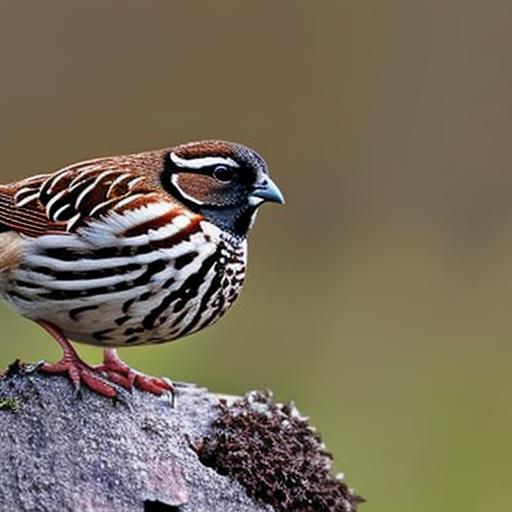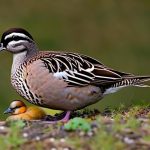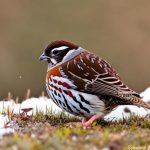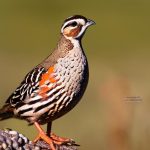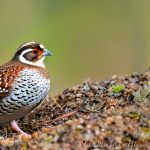When it comes to choosing the right quail species for your habitat, there are several factors to consider. First and foremost, you’ll want to think about the purpose of raising quail. Are you looking to raise quail for meat, eggs, or as pets? Different species of quail are better suited for different purposes. For example, if you’re interested in raising quail for their eggs, you might want to consider the Coturnix quail, also known as the Japanese quail. This species is known for its prolific egg-laying abilities and is a popular choice for backyard quail enthusiasts. On the other hand, if you’re interested in raising quail for meat, you might want to consider the Bobwhite quail, which is known for its plump and flavorful meat.
Another important factor to consider when choosing the right quail species is the climate and habitat in which you’ll be raising them. Some species of quail are better suited for colder climates, while others thrive in warmer environments. Additionally, some species of quail are more adaptable to different types of habitats, while others have more specific habitat requirements. For example, the Gambel’s quail is well adapted to arid desert environments, while the Northern Bobwhite prefers grasslands and agricultural fields. By considering these factors, you can ensure that you choose a quail species that is well-suited to your specific needs and environment.
Key Takeaways
- Choose the right quail species based on your specific needs and preferences, such as egg production, meat quality, or ornamental purposes.
- Create an ideal quail habitat by providing adequate space, shelter, and protection from predators.
- Provide proper nutrition for quail by offering a balanced diet that includes commercial feed, fresh water, and occasional treats.
- Understand quail behavior and social dynamics to ensure a harmonious and stress-free environment within the flock.
- Maintain quail health and prevent diseases by practicing good hygiene, regular health checks, and vaccination when necessary.
- Manage quail breeding and egg production by selecting healthy breeding stock and providing optimal conditions for egg laying.
- Handle and interact with quail gently and calmly to minimize stress and ensure their well-being.
Creating the Ideal Quail Habitat
Creating the ideal habitat for your quail is essential for their health and well-being. Quail are ground-dwelling birds that require a habitat with plenty of space to roam and forage. When designing a quail habitat, it’s important to provide a mix of open space and cover, as well as access to food and water. Quail also require protection from predators, so it’s important to include features such as brush piles, shrubs, and other forms of cover to provide them with a safe place to hide.
In addition to providing adequate space and cover, it’s important to consider the type of substrate in the quail habitat. Quail prefer habitats with sandy or gravelly soil, as this type of substrate is ideal for dust bathing, which is an important behavior for maintaining their plumage and skin health. It’s also important to provide access to clean water for drinking and bathing, as well as a variety of natural foods such as seeds, insects, and vegetation. By creating a habitat that meets these requirements, you can ensure that your quail are happy and healthy.
Providing the Proper Nutrition for Quail
Proper nutrition is essential for the health and well-being of quail. In the wild, quail are omnivorous birds that feed on a variety of foods including seeds, insects, and vegetation. When raising quail in captivity, it’s important to provide them with a balanced diet that meets their nutritional needs. A good quality game bird feed can serve as the foundation of a quail’s diet, providing essential nutrients such as protein, vitamins, and minerals. Additionally, offering supplemental foods such as fresh fruits and vegetables, mealworms, and greens can help provide variety and enrichment for your quail.
It’s also important to ensure that quail have access to clean water at all times. Quail require water not only for drinking, but also for bathing and maintaining their plumage. Providing a shallow dish or container filled with clean water can help meet their hydration needs. It’s important to monitor their water source regularly to ensure that it remains clean and free of contaminants.
In addition to providing a balanced diet and access to clean water, it’s important to monitor your quail’s body condition and adjust their diet as needed. Overfeeding can lead to obesity and health issues, while underfeeding can result in malnutrition. By monitoring your quail’s body condition and adjusting their diet accordingly, you can ensure that they receive the proper nutrition they need to thrive.
Understanding Quail Behavior and Social Dynamics
Quail are social birds that live in groups known as coveys. Understanding their behavior and social dynamics is essential for providing them with a suitable environment in captivity. Quail are ground-dwelling birds that spend much of their time foraging for food and seeking cover from predators. They are also known for their distinctive calls and vocalizations, which play an important role in communication within the covey.
Quail have a complex social structure within their coveys, with dominant individuals establishing hierarchies and maintaining order within the group. It’s important to provide enough space and resources within the habitat to prevent overcrowding and competition among the birds. Additionally, providing plenty of cover such as shrubs and brush piles can help reduce aggression and provide hiding places for subordinate individuals.
Understanding quail behavior can also help in identifying signs of stress or illness within the group. Changes in behavior such as increased aggression, decreased activity, or changes in vocalizations can be indicators of underlying issues that need to be addressed. By observing their behavior closely and providing a suitable environment that meets their social needs, you can ensure that your quail are happy and healthy.
Maintaining Quail Health and Preventing Diseases
Maintaining the health of your quail is essential for their overall well-being. Regular health checks and monitoring for signs of illness are important aspects of caring for quail in captivity. It’s important to observe your quail regularly for any changes in behavior or appearance that may indicate an underlying health issue. Common signs of illness in quail include lethargy, decreased appetite, respiratory issues, or changes in droppings.
Preventing diseases in quail starts with providing a clean and sanitary environment. Regularly cleaning the habitat and providing fresh bedding can help reduce the risk of disease transmission. Additionally, providing access to clean water and a balanced diet can help support their immune system and overall health.
It’s also important to quarantine new birds before introducing them to an existing flock to prevent the spread of diseases. Quarantining new birds for a period of time allows you to observe them for any signs of illness before introducing them to the rest of the group.
In addition to preventative measures, it’s important to have a plan in place for addressing any health issues that may arise. Establishing a relationship with a veterinarian who has experience with poultry can be valuable in providing care for your quail when needed.
Managing Quail Breeding and Egg Production

If you’re interested in breeding quail for eggs or expanding your flock, it’s important to understand the basics of managing quail breeding and egg production. Quail reach sexual maturity at around 6-8 weeks of age, at which point they will begin laying eggs. Providing a suitable environment with adequate space, nesting areas, and a balanced diet can help support successful breeding and egg production.
When managing quail breeding, it’s important to provide a ratio of one male to every three to five females to prevent overbreeding and aggression among the birds. Additionally, providing suitable nesting areas such as small boxes or shelters filled with soft bedding can encourage hens to lay eggs in a safe and comfortable environment.
Collecting eggs regularly is important for maintaining egg production and preventing broodiness in hens. Broodiness occurs when a hen becomes determined to hatch her eggs, which can lead to a decrease in egg production. By collecting eggs regularly, you can help prevent broodiness and maintain consistent egg production.
It’s also important to monitor the fertility of eggs when breeding quail. Regularly checking for signs of fertility such as blood spots or developing embryos can help ensure successful hatching when incubating eggs.
Handling and Interacting with Quail
When it comes to handling and interacting with quail, it’s important to approach them with care and respect for their natural behaviors. Quail are generally skittish birds that are easily startled by sudden movements or loud noises. When handling quail, it’s important to move slowly and calmly to avoid causing unnecessary stress.
It’s also important to provide opportunities for positive interactions with your quail to help build trust and reduce fearfulness. Spending time near their habitat without making sudden movements or loud noises can help acclimate them to your presence over time.
When handling quail for tasks such as health checks or moving them to a new location, it’s important to do so gently and with minimal stress on the birds. Approaching them from behind and using both hands to support their body can help prevent injury or escape.
Overall, understanding the natural behaviors of quail and approaching them with care and respect is essential for building a positive relationship with these fascinating birds. By providing a suitable environment that meets their needs and interacting with them in a gentle manner, you can ensure that your quail are happy and healthy in captivity.
If you’re looking for advice on keeping quail, you may also be interested in learning about converting a shed into a chicken coop. This article from Poultry Wizard provides valuable insights into creating a suitable living space for your poultry. Check out the article to discover practical tips for transforming a shed into a comfortable and functional home for your feathered friends.
FAQs
What are some basic tips for keeping quail?
Quail require a secure and spacious enclosure, a balanced diet, access to clean water, and protection from predators. They also need proper ventilation and lighting in their living space.
What should I feed my quail?
Quail should be fed a balanced diet of commercial quail feed, supplemented with fresh greens, fruits, and vegetables. They also require access to grit and calcium for proper digestion and egg production.
How do I keep my quail safe from predators?
To keep quail safe from predators, it’s important to provide a secure enclosure with a solid floor and a roof. Additionally, using wire mesh with small openings can help prevent predators from gaining access to the quail.
How do I ensure proper ventilation for my quail?
Proper ventilation for quail can be achieved by providing adequate air flow in their enclosure. This can be done by using vents or windows, and ensuring that the bedding is kept dry to prevent mold and ammonia buildup.
What kind of lighting do quail need?
Quail require a consistent lighting schedule to maintain their health and egg production. A combination of natural light and artificial lighting can be used to ensure they receive 14-16 hours of light per day.
Meet Walter, the feathered-friend fanatic of Florida! Nestled in the sunshine state, Walter struts through life with his feathered companions, clucking his way to happiness. With a coop that’s fancier than a five-star hotel, he’s the Don Juan of the chicken world. When he’s not teaching his hens to do the cha-cha, you’ll find him in a heated debate with his prized rooster, Sir Clucks-a-Lot. Walter’s poultry passion is no yolk; he’s the sunny-side-up guy you never knew you needed in your flock of friends!

